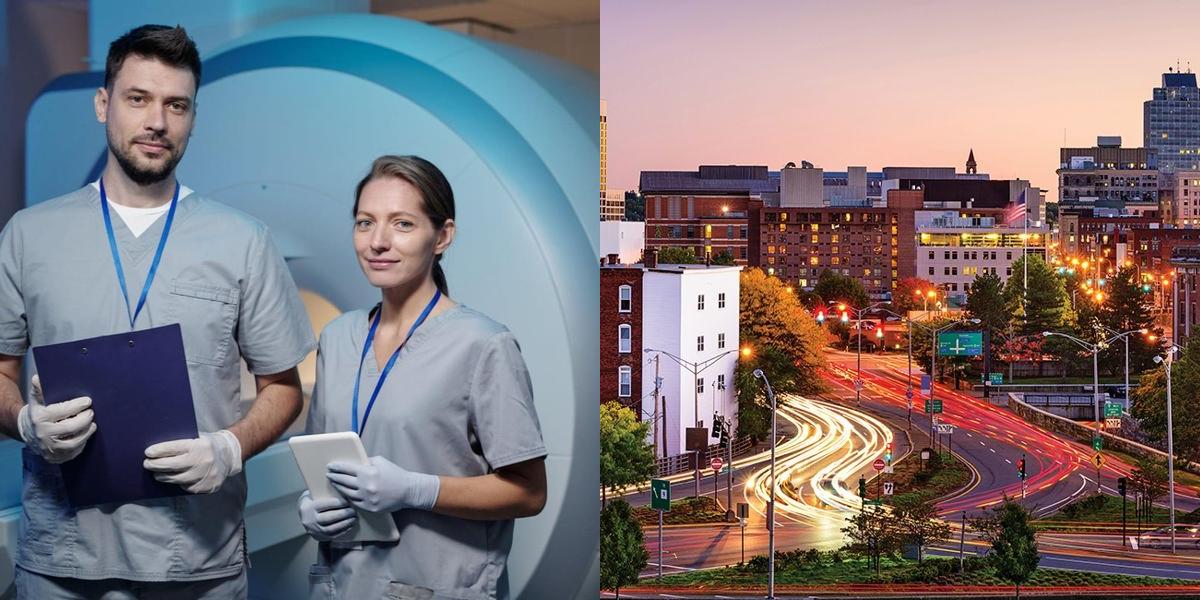Key Points
- Complete a JRCERT-accredited radiologic technology program
- Pass the ARRT certification exam to qualify for licensure
- Apply for the Massachusetts temporary radiologic technologist license
- Upgrade to a full state license after ARRT results
- Radiologic technologists in MA make $96,180/year
Step 1: Complete a JRCERT-Accredited Radiologic Technology Program
To become a radiology technician, you must complete an associate degree in radiologic technology from a program accredited by the Joint Review Committee on Education in Radiologic Technology (JRCERT). Accreditation ensures you meet the educational standards required for certification.
Expect about 2 years of:
- Anatomy and imaging coursework
- Radiation safety
- Patient care training
- Hands-on clinical rotations
Many Massachusetts students attend programs at community colleges such as MassBay, Middlesex, or Holyoke.
If you're ready to begin training, explore local options:
Step 2: Meet ARRT Certification Requirements
Massachusetts requires ARRT certification to qualify for licensure. The ARRT Registered Technologist (R.T.) credential confirms you meet national standards in patient care, image production, and radiation safety.
To qualify, you must complete the Primary Eligibility Pathway, which includes:
- Education: An associate degree plus completion of an ARRT-approved radiography program
(ARRT Education Requirements)
- Ethics: You must meet ARRT’s ethics standards, including background and conduct review
- Exam: Pass the ARRT Radiography exam, which covers patient care, image acquisition, image evaluation, and radiation safety
(Exam Details)
ARRT application fee: $225
Source: ARRT Application Fees
Once you pass the exam, you earn the R.T.(R) credential and become eligible for Massachusetts licensure.
Step 3: Apply for a Temporary Massachusetts Radiologic Technologist License
After completing your program—and before or after taking the ARRT exam—you may apply for a temporary license through the Massachusetts Radiation Control Program.
This temporary license:
- Allows you to begin working
- Is valid for one year
- Requires a completion letter from your school
- Must be submitted through the state’s licensing portal (mass.gov)
It allows you to work while waiting for your ARRT results and final approval.
Step 4: Obtain Your Full Massachusetts License
After passing the ARRT exam, submit your results to the Radiation Control Program to convert your temporary license into a full Radiologic Technologist License.
Approval time varies, but many applicants receive their full license within several weeks.
Step 5: Start Working as a Radiologic Technologist
Once licensed, you can work in:
- Hospitals
- Outpatient imaging centers
- Physician offices
- Urgent care centers
Most new technologists begin with X-ray and later explore additional ARRT credentials in CT, MRI, or other specialties through the ARRT postprimary pathways.
How Long Does It Take to Become a Radiology Technician in Massachusetts?
Most students finish in 2 to 3 years:
- 2 years for an associate degree
- Additional time for exam scheduling and licensing
How Much Do Radiology Technologists Make in Massachusetts?
Radiologic technologists earn $96,180/year based on BLS 2024 data.
Pay varies by experience, employer type, and specialization.







